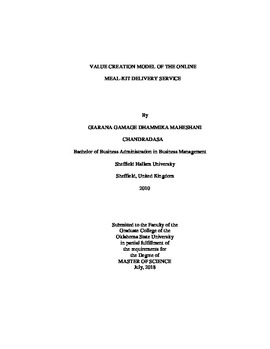| dc.contributor.advisor | Park, Hyejune | |
| dc.contributor.author | Chandradasa, Giarana Gamage Dhammika Maheshani | |
| dc.date.accessioned | 2019-03-25T20:05:18Z | |
| dc.date.available | 2019-03-25T20:05:18Z | |
| dc.date.issued | 2018-07-01 | |
| dc.identifier.uri | https://hdl.handle.net/11244/317683 | |
| dc.description.abstract | The online meal-kit delivery service (OMDS) is one of the growing retail business models in the retail industry. Consumers attribute value to OMDS purchases based on a combined assessment of their personal resources and the firm's resources. Hence, resources play a significant role in the value creation process of OMDS. The purpose of this study is to understand the value involvement in the products and services of OMDS created by both consumers and firms and understanding the role of perceived value on adoption intentions for the service offerings. The specific research objectives were (a) to identify the potential firm resources and consumer resources to determine the value of OMDS as perceived by consumers and (b) to examine the impact of consumers' value creation on the adoption intention of OMDS. The conceptual model used in this study was adopted from Barrutia and Gilsanz (2013) that examines value creation in a business to consumer e-commerce context. Integration of consumer resources and firm resources is the basic underlying concept of the value co-creation model developed by Barrutia and Gilsanz (2013). This research employed a quantitative survey research approach. The targeted sample for this study was U.S. consumers aged 18 or older. The questionnaire was distributed among participants using the Amazon Mechanical Turk (www.MTurk.com) website. Scales to measure each of the constructs in the model were adopted from the previous literature to address OMDS. A combination of descriptive statistics and inferential statistics was used to analyze the data in the study. Multiple regression analysis was used to test the research hypotheses. The results suggested that variety and convenience did not significantly influence OMDS value creation while consumer and firm resources demonstrated significant relationships to OMDS value creation. | |
| dc.format | application/pdf | |
| dc.language | en_US | |
| dc.rights | Copyright is held by the author who has granted the Oklahoma State University Library the non-exclusive right to share this material in its institutional repository. Contact Digital Library Services at lib-dls@okstate.edu or 405-744-9161 for the permission policy on the use, reproduction or distribution of this material. | |
| dc.title | Value Creation Model of the Online Meal-Kit Delivery Service | |
| dc.contributor.committeeMember | Clare, Gregory Paul | |
| dc.contributor.committeeMember | Kang, Mihyun | |
| osu.filename | Chandradasa_okstate_0664M_15917.pdf | |
| osu.accesstype | Open Access | |
| dc.description.department | Design, Housing and Merchandising | |
| dc.type.genre | Thesis | |
| dc.type.material | text | |
